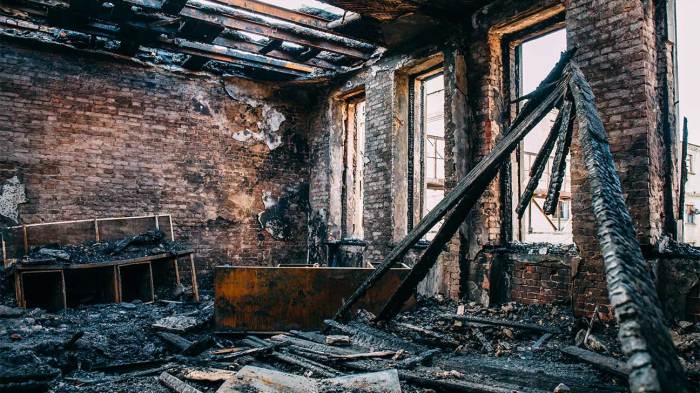Home insurance claims for fire and smoke damage set the stage for understanding the intricate process and coverage details that homeowners need to be aware of. Dive into this comprehensive guide to learn more.
Understanding Home Insurance Claims Process for Fire and Smoke Damage

When it comes to filing a home insurance claim for fire and smoke damage, there are several important steps to follow to ensure a smooth process and fair assessment.
Typical Steps in Filing a Home Insurance Claim
- Contact your insurance company as soon as possible after the fire or smoke damage occurs to initiate the claims process.
- Document the damage by taking photos or videos of the affected areas and items. This will serve as crucial evidence during the assessment.
- Prepare a detailed list of all damaged or destroyed property, including their value and purchase date, if possible.
- Submit a written claim to your insurance company, providing all necessary information and documentation to support your claim.
- Cooperate with the insurance adjuster assigned to your claim, providing access to the property for assessment and answering any questions they may have.
- Review the settlement offer from your insurance company and negotiate if necessary to ensure fair compensation for the damage incurred.
Documentation Required for Fire and Smoke Damage Claims
- Copies of the home insurance policy and any relevant endorsements.
- Photos or videos of the damage, including before and after shots if possible.
- Inventory of damaged or destroyed items, including their value and age.
- Receipts or proof of purchase for damaged items, if available.
- Reports from fire department or other authorities documenting the cause and extent of the fire damage.
Role of Insurance Adjusters in Assessing Claims
Insurance adjusters play a crucial role in assessing fire and smoke damage claims by:
- Inspecting the property to evaluate the extent of the damage and determine the cause of the fire or smoke.
- Reviewing documentation provided by the policyholder to support the claim, such as photos, inventory lists, and receipts.
- Calculating the actual cash value or replacement cost of the damaged property based on the policy coverage.
- Negotiating with the policyholder to reach a fair settlement that covers the losses incurred due to fire and smoke damage.
Coverage Details for Fire and Smoke Damage: Home Insurance Claims For Fire And Smoke Damage

When it comes to home insurance policies, coverage for fire and smoke damage is a crucial aspect to consider. Understanding the types of coverage provided and the differences between actual cash value and replacement cost coverage can help homeowners navigate the claims process more effectively.
Types of Coverage Provided
- Dwelling coverage: This type of coverage helps repair or rebuild your home if it is damaged by fire or smoke.
- Personal property coverage: This coverage helps replace or repair your personal belongings affected by fire or smoke damage.
- Additional living expenses: If your home becomes uninhabitable due to fire or smoke damage, this coverage helps with temporary living expenses.
Differences between Actual Cash Value and Replacement Cost Coverage, Home insurance claims for fire and smoke damage
- Actual cash value: This type of coverage takes depreciation into account when determining the value of your damaged property. The payout is based on the current market value of the item.
- Replacement cost coverage: With this coverage, the insurance company will reimburse you for the cost of replacing your damaged property with a new item of similar kind and quality, without deducting for depreciation.
Items Typically Covered under Home Insurance Policy
- Furniture
- Clothing
- Electronics
- Appliances
- Structural damage to the home
Preventing Fire and Smoke Damage in Homes
![]()
Fires can devastate homes and cause significant damage, making prevention crucial. Here are some tips for homeowners to prevent fire and smoke damage in their homes.
Importance of Smoke Detectors and Fire Extinguishers
Smoke detectors and fire extinguishers are essential tools in preventing fire and smoke damage. Smoke detectors can alert homeowners to potential fires early on, giving them the opportunity to extinguish the fire or evacuate safely. Fire extinguishers, on the other hand, can help contain small fires before they escalate and cause extensive damage.
- Ensure smoke detectors are installed on every level of the home, especially near bedrooms.
- Test smoke detectors regularly and replace batteries as needed.
- Place fire extinguishers in easily accessible areas, such as the kitchen and garage.
- Learn how to properly use a fire extinguisher and ensure everyone in the household knows as well.
Regular Maintenance of Electrical Systems and Appliances
Electrical systems and appliances can be common sources of house fires if not properly maintained. Regular maintenance can help reduce the risk of fire and smoke damage in homes.
- Have a professional inspect the electrical system in your home regularly.
- Check for frayed wires, overloaded outlets, and other signs of electrical issues.
- Clean lint traps in dryers regularly to prevent lint buildup that can lead to fires.
- Inspect appliances for any signs of wear and tear and replace or repair as needed.
Rebuilding and Restoration After Fire and Smoke Damage
After experiencing fire and smoke damage in a home, the process of rebuilding and restoration is crucial to get back to a safe and habitable living environment. This phase involves various steps and the assistance of restoration companies to address the damage effectively.
Role of Restoration Companies
Restoration companies play a vital role in cleaning up and repairing fire and smoke damage in a home. These professionals have the expertise, equipment, and resources to assess the extent of the damage, remove debris, and clean the affected areas thoroughly. They also specialize in eliminating smoke odors, repairing structural damage, and restoring the property to its pre-damaged condition.
- Restoration companies conduct a detailed assessment of the damage to create a comprehensive restoration plan.
- They use specialized equipment such as air scrubbers, ozone generators, and thermal foggers to remove smoke particles and odors.
- Restoration professionals are trained to handle the cleanup and restoration process efficiently and safely.
- They work closely with insurance companies to ensure that the restoration process is covered by the homeowner’s insurance policy.
Challenges During the Rebuilding Process
Homeowners may face several challenges during the rebuilding process after fire and smoke damage. These challenges can prolong the restoration timeline and add stress to an already difficult situation.
- Dealing with insurance claims and approvals for the restoration work can be a complex and time-consuming process.
- Finding reputable and reliable restoration companies to perform the necessary repairs and restoration tasks may be challenging, especially in the aftermath of a widespread disaster.
- Coordinating with contractors, inspectors, and other professionals involved in the rebuilding process requires effective communication and project management skills.
- Managing the emotional toll of witnessing the destruction of one’s home and belongings can make the rebuilding process overwhelming for homeowners.
In conclusion, navigating home insurance claims for fire and smoke damage requires attention to detail and a proactive approach. By staying informed and prepared, homeowners can effectively handle any potential challenges that may arise.
When it comes to home insurance, understanding the difference between replacement cost and actual cash value is crucial. Home insurance replacement cost vs. actual cash value can impact your coverage and financial protection in the event of a claim. Make sure you are well-informed about these terms to make the best decision for your home insurance needs.
One of the common questions homeowners have is whether their insurance covers fire damage. It’s important to know that policies vary, but generally, homeowners insurance covers fire damage. However, it’s always a good idea to review your policy and understand the specific coverage you have in place.
Location plays a significant role in determining home insurance rates. Factors such as crime rates, weather patterns, and proximity to emergency services can impact your premiums. Understanding what affects home insurance rates by location can help you make informed decisions when it comes to protecting your home.




